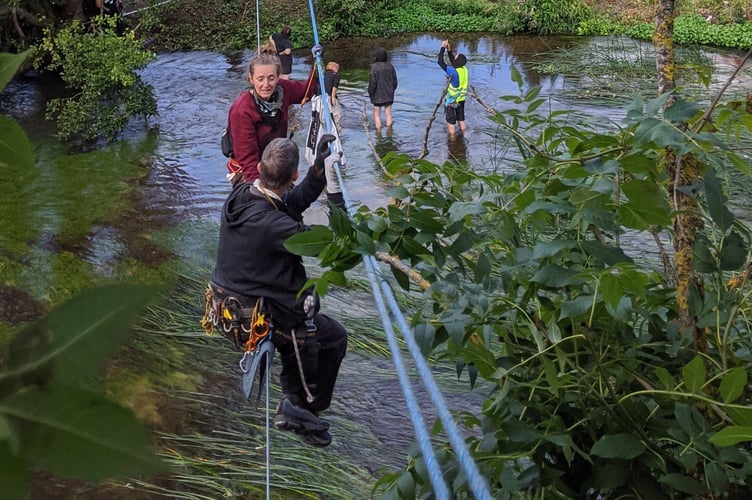Totnes environmental protester, Dr Larch Maxey, is one of four HS2 protesters acquitted of aggravated trespass at High Wycombe Magistrates Court.
The 49-year-old geography lecturer sat on a line suspended 25 feet above the River Colne Ford at Denham Country Park, Buckinghamshire in a bid to protect an ancient alder tree on 24 July 2020.
Dr Maxey and three others sat on the line for more than 13 hours. The tree was eventually felled to build a temporary access bridge and road to move two pylons, said HS2 Rebellion.

In a statement, HS2 Rebellion said district judge Pilling “accepted expert testimony” the 200-plus-year-old Alder was “a suitable habitat for many of the 17 species of rare and protected bats living locally.”
The statement added: “Then the HS2 ecologist told the court, under oath, that HS2 did not have a bat licence at the time they felled the tree, raising concerns, shared by the judge, that the felling was illegal.”
Speaking after the hearing, Dr Maxey described the moment the police heights team cut fellow protester, Samantha Smithson’s, safety line.
He said: “We were horrified that they cut her safety line as it was so dangerous. Sam was plunged into freefall from over 25 feet up and could easily have been killed.”
Solicitor Simon Natas who represented the campaigners said: “My clients were accused of obstructing the lawful felling of an ancient alder tree.
“They maintained that they were acting to prevent potential wildlife crimes, in particular with regard to bats.
“In acquitting them of aggravated trespass, the district judge made it clear that she was ‘not impressed by the lack of detail’ in the evidence of the ecologist who had supervised the works that day and whose job it was to ensure that the felling was conducted lawfully.
“There was uncertainty about what surveys had been carried out and when and whether workmen had been properly briefed about potential risks to wildlife.
“Ultimately, she concluded that there was a real risk that breaches of wildlife protection legislation may have occurred that day, which is what my clients have argued all along.”





Comments
This article has no comments yet. Be the first to leave a comment.